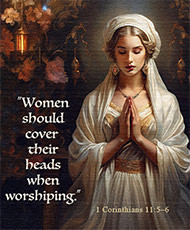First Corinthians 11:2–16 . . .
Propriety in Worship
Apostle Paul begins a new section — chapters 11 through 14 — in this letter that highlights his concern for how God’s people conduct themselves in a church worship setting. He’ll discuss three primary issues: gender distinction (11:2–16, covered today), the Lord’s Supper (11:17–34, see Warren’s commentary), and spiritual gifts (chapters 12 through 14).
In today’s passage (11:2–16, read this passage at the bottom of the page), we’ll consider the roles of men and women in the church. By telling the Corinthians, “Honor your head when worshiping,” Paul shares four principles, in fifteen verses, that will guide them and us in understanding a woman’s role in the church. The first of four principles is . . . .
1) Honor your head for the sake of biblical teaching — vv. 2–6 (see this passage at the bottom of the page). In these five verses, Paul will discuss the importance of “honoring your spiritual head.” That said, buckle your seatbelts; we’re going in where angels fear to tread.
In vv. 3–6, Paul introduces “the principle of headship” and the appropriate response: “But I want you to realize that the head of every man is Christ, and the head of the woman is man, and the head of Christ is God” (v. 3). Introducing the basic premise that everyone has a head — as being a leader type not a body part — the word “head” is difficult to interpret because it can have three possible meanings: (1) prominence, (2) authority, or (3) source. In most cases, the word carries the nuance of prominence. However, Paul narrows it down further to “preeminence” (noun: the fact of surpassing all others; superiority). Thus, Paul seems to mean that just as the Son of God acknowledges the preeminence of the Father, and men acknowledge the preeminence of Christ; accordingly, women acknowledge the preeminence of men in a husband-wife relationship. But prominence in a relationship doesn’t imply superiority or inferiority; certainly not in the relationship between the Father and the Son nor between men and women in the church. Simply understood: the head of a woman is man.
Next, Paul applies the spiritual principle of headship (vv. 4–6) in the context of praying and prophesying in public worship. He says that, in the first-century Corinthian setting, men shouldn’t have their heads covered but women should. The reason men shouldn’t have their heads covered was that, in the world of Corinth, this was often associated with idolatry. Men who didn’t cover their heads in that culture honored Christ as being preeminent. Women in Corinth were called to cover their heads with a scarf or shawl — not a stylish hat or inconspicuous doily, but a shawl that covered her entire head, concealing her hair. This demonstrated their respect for their husbands and church leadership.
To refuse to wear such a shawl would have been disgraceful. For a woman to have her head uncovered in mixed company could catch the eyes of men, suggesting the offering of innuendos of attraction, which in the worship setting then and today could easily distract people from true worship.
Must a Christian woman cover her head during church worship service today? Hopefully, that isn’t how Paul would have us understand this passage. In his day, the head covering was intended to display the woman’ subordination to man, to Christ, and to the Father.
2) Honor your head for the sake of creation (vv. 7–12) Paul explains further why he wants women to wear head coverings and why men shouldn’t. In vv. 7–9, Paul briefly summarizes the Father’s creativity at work in God’s purposes for men and women. Woman was created from the man and for the man. In other words, woman reflects the glory of man when she submits to God’s order.
In vv. 11–12, there’s a wonderfully strong emphasis on the mutuality of men and women in marriage in the church. We can’t get along without each other; we’re mutually dependent on each other; we complement one another. This mutual dependence of man and woman is grounded in creation (v. 12).
3) Honor your head for the sake of pattern of nature (vv. 13–15) Paul appeals in these verses to what is natural or typical in Corinth. He asks, “Is it proper for a woman to pray to God with her head uncovered?” Here, Paul emphasizes the single point of his passage as he focuses solely on women: Women should stop praying with their heads uncovered. In the culture of Corinth, it wasn’t proper for a woman to act as a spokesperson for godly people by praying publicly with her head uncovered. To do so would be tantamount to claiming the position of a man in God’s order. The apostle didn’t think it natural or wise for Christian women to exercise their liberty in a way that would go against socially accepted behavior. Today, what’s socially accepted is different, but the woman’s attitude is still crucial.
4) Honor your head for the sake of apostolic authority (vv. 16) In Paul’s final argument, he appeals to apostolic authority: “If anyone wants to be contentious about this, we have no other practice — nor do the churches of God.” In his closing verse, Paul informed the not-yet-convinced that the other churches followed what he’d just explained. The issue is obedience to what Paul has said from beginning to end, namely, “Will the ladies of the church at Corinth obey biblical instruction?”
Note: 1st Corinthians challenges believers to examine every aspect of their lives through the lens of the Gospel. In chapters 11–14, Paul presents these four challenges:
Covering the head in worship (ch. 11) | Concerning spiritual gifts (ch. 12)
The supremacy of love (ch. 13) | Intelligibility in worship (ch. 14)
› Watch BibleProject’s superb animated video (2 minutes) that highlights Paul’s messages in these four chapters.
† Summary of 1 Corinthians 11:2–16
Herein, Paul addresses the issue of head coverings and proper conduct during worship. Here’s a summary of its key points:
• Headship and Authority
Paul establishes a hierarchy of authority:
† The head of every man is Christ.
† The head of a woman is man.
† The head of Christ is Father God.
This hierarchy forms the basis for his subsequent instructions.
• Head Coverings When Worshiping
Next, Paul provides instructions regarding head coverings during prayer and prophecy:
† Men shouldn’t cover their heads.
† Women should cover their heads.
He argues that for a man to cover his head dishonors his head (Christ), while a woman who prays or prophesies with her head uncovered dishonors her head (man).
• Reasons for Head Coverings
Paul offers three reasons for these instructions:
1) Man is the image and glory of God, while woman is the glory of man.
2) Woman was created for man, not man for woman.
3) Because of the presence of angels (in v. 10b, Paul might have meant this about “angels”).
• Mutual Dependence
Despite the hierarchy, Paul emphasizes the mutual dependence of men and women in the Lord. He states that neither is independent of the other, as woman came from man, but man is now born of woman (v. 12).
• Appeal to Nature and Custom
Paul appeals to nature, arguing that long hair is a woman’s glory and given to her as a covering. He also refers to the custom of the churches of God, suggesting that his instructions align with broader Christian practice (vv. 13–16).
Conclusion Paul concludes by stating that if anyone wants to be contentious about this, the churches of God have no other practice. This passage has been the subject of much debate and interpretation throughout church history, particularly regarding its application in different cultural contexts.
- Q. 1 Why are most churches uncomfortable with women serving during the Sunday worship service? If God permits submissive women to pray and prophesy (11:5), is it appropriate to restrict women from participating in these acts of service?
- Q. 2 Do you exhibit respect for women in your church? Do you look for ways to encourage women in their ministries?
- Q. 3 Generally speaking, what strengths do women bring to worship and ministry in the church? Why do men and women need to serve together in the church?
1 Corinthians 11:2–16
New International Version (NIV)
[You can view it in a different version by clicking here; you can also listen to this chapter.]
On Covering the Head in Worship
2I praise you for remembering me in everything and for holding to the traditions just as I passed them on to you. 3But I want you to realize that the head of every man is Christ, and the head of the woman is man, and the head of Christ is God. 4Every man who prays or prophesies with his head covered dishonors his head. 5But every woman who prays or prophesies with her head uncovered dishonors her head — it is the same as having her head shaved. 6For if a woman does not cover her head, she might as well have her hair cut off; but if it is a disgrace for a woman to have her hair cut off or her head shaved, then she should cover her head.
7A man ought not to cover his head, since he is the image and glory of God; but woman is the glory of man. 8For man did not come from woman, but woman from man; 9neither was man created for woman, but woman for man. 10It is for this reason that a woman ought to have authority over her own head, because of the angels. 11Nevertheless, in the Lord woman is not independent of man, nor is man independent of woman. 12For as woman came from man, so also man is born of woman. But everything comes from God.
13Judge for yourselves: Is it proper for a woman to pray to God with her head uncovered? 14Does not the very nature of things teach you that if a man has long hair, it is a disgrace to him, 15but that if a woman has long hair, it is her glory? For long hair is given to her as a covering. 16If anyone wants to be contentious about this, we have no other practice — nor do the churches of God.

